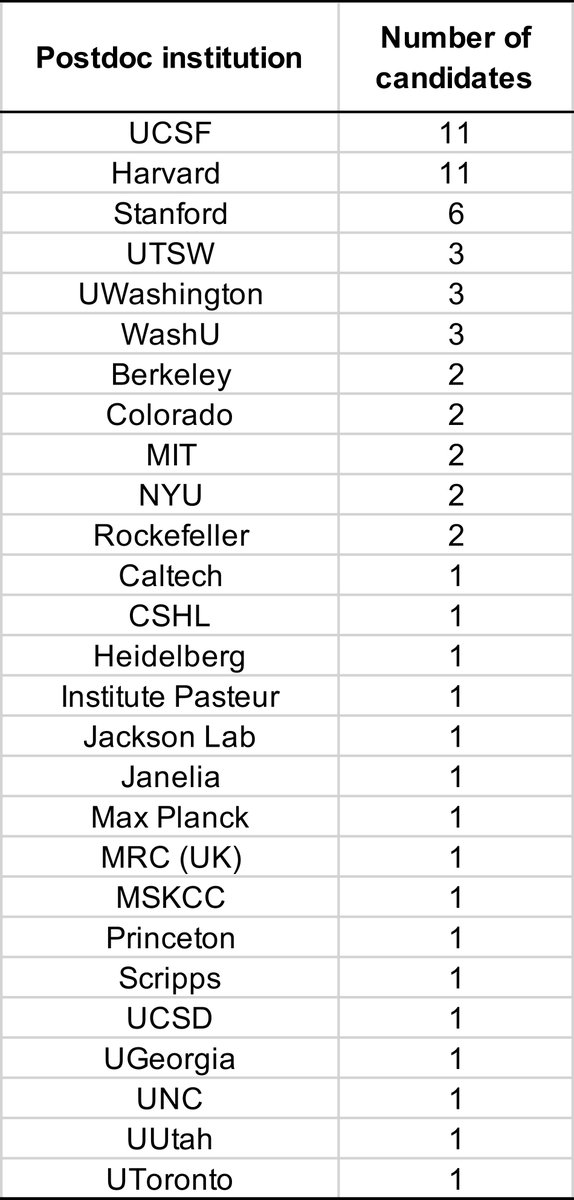Here are the publication records and research topic areas of 63 faculty candidates in the life sciences who interviewed at R1 institutions in 2019-2020.
70% have a first-author paper in Cell, Nature, or Science, 22% have a K99, and 30% have unpublished work on bioRxiv.
70% have a first-author paper in Cell, Nature, or Science, 22% have a K99, and 30% have unpublished work on bioRxiv.
Methods: faculty candidate seminars were found on public departmental websites. Pub records were acquired from Google Scholar or Pubmed, and K99& #39;s were found on NIH Reporter. I did my best to summarize research topics by reading the abstracts of a candidate& #39;s recent papers.
The candidates were interviewed at a variety of public and private R1 institutions. I focused on departments studying genetics, cell biology, cancer biology, biochemistry, and related fields in the life sciences.
Limitations: the set of job market candidates isn& #39;t comprehensive, as only a subset of institutions could be included. For pub records, I tried to count co-first authorships but may have missed some. Twitter accounts only include those that are in a candidate& #39;s name.
Motivation: faculty hiring is an exceptionally opaque process, and there is very little information available on what is needed to succeed. I think that such opacity empowers "the old boys& #39; club" and other potential sources of bias.
By collecting and sharing data on faculty searches, I hope that I can make the process more transparent, highlight what the current academic job market looks like, and help people make informed decisions.
Prior data: You can find some of my previous threads on this topic linked below.
https://twitter.com/JSheltzer/status/752885288775614464">https://twitter.com/JSheltzer...
https://twitter.com/JSheltzer/status/1140671289277001730">https://twitter.com/JSheltzer... https://twitter.com/JSheltzer/status/1093027545392521217">https://twitter.com/JSheltzer...
https://twitter.com/JSheltzer/status/752885288775614464">https://twitter.com/JSheltzer...
https://twitter.com/JSheltzer/status/1140671289277001730">https://twitter.com/JSheltzer... https://twitter.com/JSheltzer/status/1093027545392521217">https://twitter.com/JSheltzer...
Current results: 44% of faculty candidates are postdocs at Stanford, UCSF, or Harvard. 92% of faculty candidates are currently at an institution in the US. 100% are in academia.
The average candidate has 5 first-author publications (median: 4, range: 2-12).
84% have published at least one first-author paper in CNS or a CNS-family journal (Nature Genetics, Science Signaling, etc.).
84% have published at least one first-author paper in CNS or a CNS-family journal (Nature Genetics, Science Signaling, etc.).
71% of interviewees for life science faculty positions have a Twitter account.
60% of the candidates are women. Among the candidates, 55% of women and 92% of men have a CNS paper. Men have an average of 5.6 publications, women have an average of 4.6 publications.
Regarding research topics: I am hesitant to extrapolate too much from this data, as I tried to summarize a candidate& #39;s research after very quickly reading their recent papers& #39; abstracts, and there could be huge differences in topics between departments.
But: I think that this data underscores how many faculty interviews are clustered in certain "hot" areas: single-cell biology (6 candidates), phase separation (4), cryo-EM (3), the microbiome (3), etc.
Question: is a K99 required to get an interview?
Unambiguously, no. I& #39;ve collected similar data for several years, and I consistently see that 20%-25% of candidates have a K99.
Unambiguously, no. I& #39;ve collected similar data for several years, and I consistently see that 20%-25% of candidates have a K99.
I can& #39;t tell you how many times I& #39;ve heard the rumor that there& #39;s some department where the first thing the search committee does is throw out the postdocs who don& #39;t have a K99. I& #39;ve looked for a while, and I can& #39;t find evidence that this ever happens.
Question: is a CNS paper required to get an interview?
No - but it probably helps. At some institutions, 70% to 90% of interviewees have a CNS paper. I of course don& #39;t know what the base rate is in the applicant pool, but I& #39;d be surprised if it& #39;s 70+% CNS.
No - but it probably helps. At some institutions, 70% to 90% of interviewees have a CNS paper. I of course don& #39;t know what the base rate is in the applicant pool, but I& #39;d be surprised if it& #39;s 70+% CNS.
(At public R1 institutions, the fraction of candidates with CNS papers seems to be lower than at private R1 institutions, but most still have CNS-family publications. See: https://twitter.com/JSheltzer/status/1140671289277001730).">https://twitter.com/JSheltzer...
And, saying that CNS papers *seem* important doesn& #39;t mean that they *should be* important, and saying that CNS papers seem *important* for getting an interview doesn& #39;t mean that they& #39;re *necessary*.
Question: do preprints help?
Yes - I think that this data suggests that candidates occasionally get interviews based on the strength of a preprint. For instance, candidates 27 and 41 seem to have their "major" postdoctoral papers up as preprints, and they received interviews.
Yes - I think that this data suggests that candidates occasionally get interviews based on the strength of a preprint. For instance, candidates 27 and 41 seem to have their "major" postdoctoral papers up as preprints, and they received interviews.
(Also, I don& #39;t know the dates when search committees met. One faculty member who& #39;s familiar with my analyses jokingly complained to me that they selected someone for an interview based off a preprint, but the preprint was later published in Nature, inflating my "CNS" count).
I think that it& #39;s really striking that 70+% of faculty candidates are on Twitter. It underscores how prevalent Twitter is as a medium for scientific conversations in 2020… and, I& #39;d imagine that that percentage is only increasing year by year.
Finally, there are obviously a lot of questions about how COVID19 affected the interview/hiring process. I can say that according to the published seminar dates, these interviews occurred prior to the COVID shutdowns. Beyond that, I don& #39;t really know.
I hope that this analysis helps shed some light on what the academic job market looks like, and that it allows scientists to make informed decisions for their careers.

 Read on Twitter
Read on Twitter




